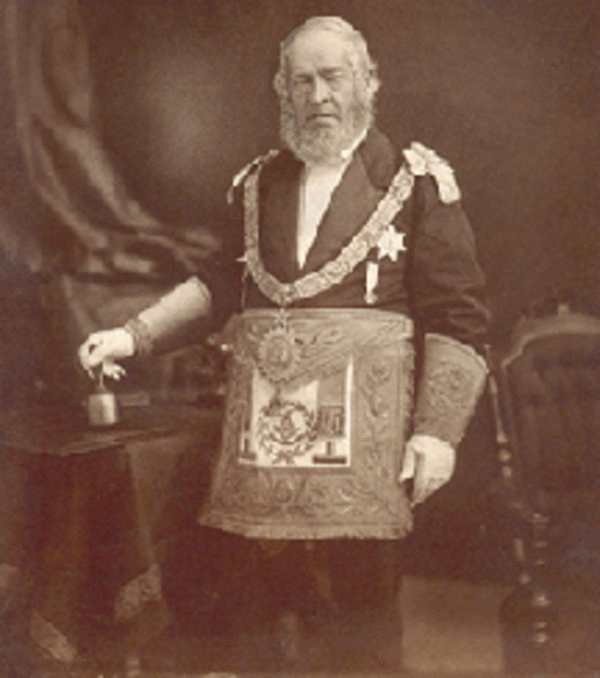
Source: Courtesy of Wikimedia Commons
KEITH, ALEXANDER, brewer and politician; b. 5 Oct. 1795 in Caithness-shire, Scotland, son of Donald Keith and Christina Brims; d. 14 Dec. 1873 in Halifax, N.S.
When Alexander Keith was 17, his father sent him to an uncle in northern England to learn the brewing business. Five years later, when Keith migrated to Halifax, he became sole brewer and business manager for Charles Boggs, and he bought out Boggs’ brewery in 1820. On 17 Dec. 1822 he married Sarah Ann Stalcup, who died in 1832. On 30 Sept. 1833 he married Eliza Keith; they had six daughters and two sons. One son, Donald G. Keith, became a partner in the brewing firm in 1853.
In 1822 Keith moved his brewery and premises to larger facilities on Lower Water Street and in 1836 he again expanded, building a new brewery on Hollis Street. In 1863 he began construction of Keith Hall which was connected by a tunnel to his brewery. Keith Hall, now occupied by Oland’s Brewery, is in the Renaissance palazzo style, with baroque adornments, pillars of no particular style, and a mansard roof. This peculiar combination of styles resulted from the fact that the designs were probably derived from books with plans of buildings in Great Britain and the United States. Keith’s appointment as a director of the Bank of Nova Scotia in 1837 along with William Blowers Bliss is an indication of his importance in the Halifax business community. Beginning in 1837, he also served as a director, at various dates, of the Halifax Fire Insurance Company. In 1838 he helped found the Halifax Marine Insurance Association, and in the 1840s he was on the board of management of the Colonial Life Assurance Company. He was also a director of the Halifax Gas, Light, and Water Company, incorporated in 1840, and in 1844 helped incorporate the Halifax Water Company, becoming a director in 1856. By 1864 Keith was a director of the Provincial Permanent Building and Investment Society. At the time of his death his estate was evaluated at $251,000.
Keith’s interest in utilities and insurance was but part of his general involvement in the public life of Halifax. He was unsuccessful in the general election of 1840 when he stood as a Conservative candidate for the town of Halifax but was elected to the first city council in 1841. In 1842 he served as a commissioner of public property and in 1843 was selected mayor of Halifax. He continued as a member of council until he again served as mayor, by election, in 1853 and 1854. In December 1843 he was appointed to the Legislative Council and in June 1867 he accepted the appointment of president of the council, declining a seat in the Canadian Senate. As a supporter of confederation and president of the council, he was helped at first by the fact that before 1 July 1867 Charles Tupper* had filled several seats in the upper house with known confederates. Although the premier, William Annand*, appointed to the upper house in November 1867, had complete control of the lower house, he did not dare introduce a resolution into the upper chamber in 1868 calling for repeal of union. The anti-confederates gradually secured control of the upper house, however, and Keith was unable to prevent passage, in 1871, of a particularly flagrant bill which took the vote from all federal officials in provincial elections. It was perhaps a commentary on Keith that he was not actively involved at this time with the Conservative party organization which was run by such party stalwarts as Philip C. Hill* and James MacDonald*.
Throughout his career Keith was connected with several charitable and fraternal societies. He served as president of the North British Society from 1831 and as chief of the Highland Society from 1868 until his death. In 1838 he was connected with the Halifax Mechanics Library and in the early 1840s with the Nova Scotia Auxiliary Colonial Society. Keith was perhaps best known to the Halifax public as a leader of the freemasons. He became provincial grand master for the Maritimes under the English authority in 1840 and under the Scottish lodge in 1845. Following a reorganization of the various divisions in 1869, he became grand master of Nova Scotia.
Halifax County Court of Probate, will of Alexander Keith. PANS, Keith family papers; “Masonic grand masters of the jurisdiction of Nova Scotia, 1738–1965,” compiled by E. T. Bliss, 1965, 21. Acadian Recorder (Halifax), 15 Dec. 1873. Morning Chronicle (Halifax), 15 Dec. 1873. Annals of the North British Society of Halifax, Nova Scotia, from its foundation in 1768, to its centenary celebration March 26th, 1868, compiled by J. S. Macdonald (Halifax, 1868), 187. G. A. White, Halifax and its business: historical sketch and description of the city and its institutions (Halifax, 1876), 87–88.
K. G. Pryke, “KEITH, ALEXANDER,” in Dictionary of Canadian Biography, vol. 10, University of Toronto/Université Laval, 2003–, accessed December 1, 2024, http://www.biographi.ca/en/bio/keith_alexander_10E.html.
The citation above shows the format for footnotes and endnotes according to the Chicago manual of style (16th edition). Information to be used in other citation formats:
| Permalink: | http://www.biographi.ca/en/bio/keith_alexander_10E.html |
| Author of Article: | K. G. Pryke |
| Title of Article: | KEITH, ALEXANDER |
| Publication Name: | Dictionary of Canadian Biography, vol. 10 |
| Publisher: | University of Toronto/Université Laval |
| Year of publication: | 1972 |
| Year of revision: | 1972 |
| Access Date: | December 1, 2024 |